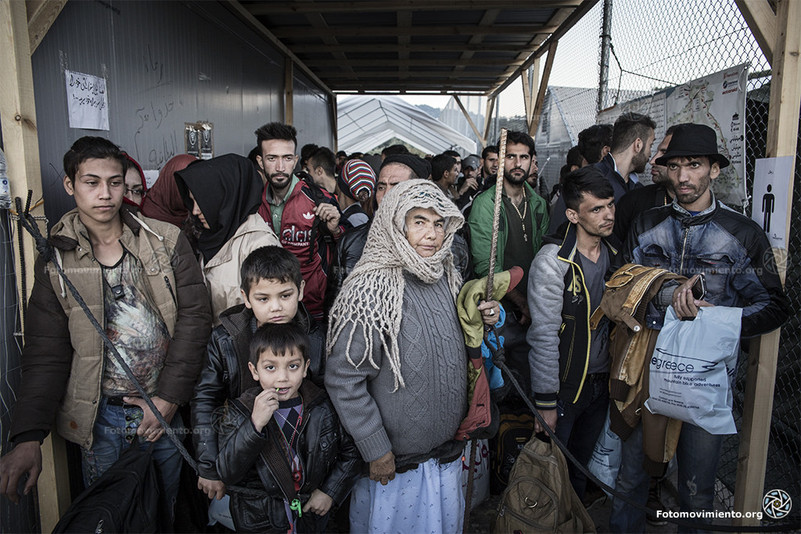Turkey arrests 1,300 migrants and smugglers after EU deal
-

Migrants arriving in Lesbos. The Greek island, just off the Turkish coast, is the main entry point to the EU (Photo: Fotomovimiento)
By
Eric Maurice
Turkish coast guards arrested around 1,300 migrants and three
suspected smugglers Monday (30 November) in a crackdown operation just a
day after the EU and Turkey reached a political deal to stem the flow
of migrants to Europe.
250 police officers raided eight different places in the region around Ayvacik, in south-western Turkey, from which people try to reach the Greek island of Lesbos.
250 police officers raided eight different places in the region around Ayvacik, in south-western Turkey, from which people try to reach the Greek island of Lesbos.
The people arrested, mainly Syrians, Afghans, Iraqis and Iranians,
were hiding in forests and on small beaches, Turkish press agencies
reported. Police also seized four boats and six motors and found the
body of a dead man.
The police operation follows a EU-Turkey summit in Brussels Sunday (29 November) where both parties "agreed to implement the Joint Action Plan which will bring order into migratory flows and help to stem irregular migration".
The EU accepted to pay €3 billion for the refugees living in Turkey and to re-open accession talks, in exchange for a Turkish promise to act against migrant trafficking.
Turkish authorities have been accused of turning a blind eye on migrants gathering on the coast to take boats to Europe and of ignoring organised smuggling.
Turkish prime minister Ahmet Davutoglu said however that he could not guarantee effective action.
"I wish I could say that the number of migrants will decline, but we cannot say this because we don't know will be going on in Syria," he said after the summit.
According to the latest figures from the UN High Commissioner for Refugees (UNHCR), 431,989 people arrived in Lesbos between 1 January and 26 November this year, more than in Chios, Samos, Kos and Leros combined.
Despite the Turkish crackdown, migrants continued to arrive on Lesbos Monday, local authorities said.
“It is clear that the dispatches from the other side have started again,” the regional governor for the Northern Aegean, Christina Kalogirou, was quoted as saying by Kathimerini newspaper.
While the UNHCR said that 3,425 migrants arrived in Greece on Sunday, compared to less than 2,000 on Friday and Saturday, Kathimerini said that more than 5,000 arrived in Lesbos alone in the past two days.
In Brussels, the European Commission said that it will present a report on 15 December over the implementation of the EU-Turkey joint action plan.
The commission will also publish a plan for a voluntary resettlement mechanism for Syrian refugees currently living in Turkey.
The idea was floated by Germany's chancellor Angela Merkel and commission president Jean-Claude Juncker at a mini-summit of eight countries on Sunday.
The eight countries - Austria, Belgium, Finland, Germany, Greece, Luxembourg, the Netherlands, and Sweden - said they were ready to receive refugees directly from Turkey.
The plan is to "take away some pressure from Turkey in the broader context of re-energized partnership," a commission spokesperson told reporters Monday.
The police operation follows a EU-Turkey summit in Brussels Sunday (29 November) where both parties "agreed to implement the Joint Action Plan which will bring order into migratory flows and help to stem irregular migration".
The EU accepted to pay €3 billion for the refugees living in Turkey and to re-open accession talks, in exchange for a Turkish promise to act against migrant trafficking.
Turkish authorities have been accused of turning a blind eye on migrants gathering on the coast to take boats to Europe and of ignoring organised smuggling.
Turkish prime minister Ahmet Davutoglu said however that he could not guarantee effective action.
"I wish I could say that the number of migrants will decline, but we cannot say this because we don't know will be going on in Syria," he said after the summit.
Main entry point
The location of Monday's operation is nevertheless a positive signal sent to the EU, as Lesbos is the main entry point for migrants to the EU from Turkey.According to the latest figures from the UN High Commissioner for Refugees (UNHCR), 431,989 people arrived in Lesbos between 1 January and 26 November this year, more than in Chios, Samos, Kos and Leros combined.
Despite the Turkish crackdown, migrants continued to arrive on Lesbos Monday, local authorities said.
“It is clear that the dispatches from the other side have started again,” the regional governor for the Northern Aegean, Christina Kalogirou, was quoted as saying by Kathimerini newspaper.
While the UNHCR said that 3,425 migrants arrived in Greece on Sunday, compared to less than 2,000 on Friday and Saturday, Kathimerini said that more than 5,000 arrived in Lesbos alone in the past two days.
In Brussels, the European Commission said that it will present a report on 15 December over the implementation of the EU-Turkey joint action plan.
The commission will also publish a plan for a voluntary resettlement mechanism for Syrian refugees currently living in Turkey.
The idea was floated by Germany's chancellor Angela Merkel and commission president Jean-Claude Juncker at a mini-summit of eight countries on Sunday.
The eight countries - Austria, Belgium, Finland, Germany, Greece, Luxembourg, the Netherlands, and Sweden - said they were ready to receive refugees directly from Turkey.
The plan is to "take away some pressure from Turkey in the broader context of re-energized partnership," a commission spokesperson told reporters Monday.

No comments:
Post a Comment